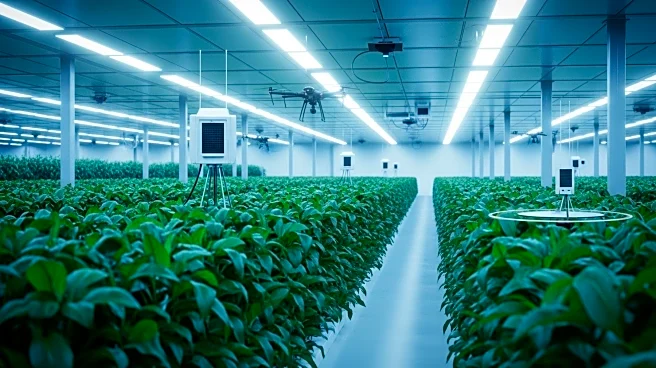What's Happening?
The Digital Agriculture Market is undergoing significant transformation, with projections indicating growth from $24.6 billion in 2024 to $65.5 billion by 2034, at a compound annual growth rate (CAGR) of 10.3%. This expansion is fueled by the integration of advanced technologies such as IoT, AI, and data analytics into traditional farming practices. These technologies enable farmers to make data-driven decisions, optimize resources, and improve productivity. Key components of digital agriculture include precision farming tools, smart irrigation systems, drones, and farm management software, all aimed at enhancing efficiency and sustainability. The market is responding to the global demand for food while striving to reduce environmental impact.
Why It's Important?
The growth of the Digital Agriculture Market is crucial for addressing the challenges of feeding a growing global population and promoting sustainable agricultural practices. By leveraging real-time data and predictive analytics, stakeholders can optimize crop yields and resource usage, which is essential for meeting food demand without exacerbating environmental degradation. The adoption of digital solutions is particularly significant in regions with advanced agricultural infrastructure, where it can lead to increased productivity and efficiency. This market expansion also presents opportunities for companies involved in agricultural technology to innovate and collaborate, potentially leading to new solutions that further enhance farming practices.
What's Next?
As the Digital Agriculture Market continues to expand, stakeholders can expect increased collaboration between technology companies and agricultural firms. Strategic partnerships, mergers, and acquisitions are likely to occur as companies seek to strengthen their market positions and enhance their offerings. Additionally, regulatory frameworks may evolve to support the adoption of digital agriculture solutions, addressing concerns such as data privacy and connectivity issues in rural areas. The focus on sustainable practices and technological innovation will likely drive further advancements in precision farming and farm management systems.
Beyond the Headlines
The integration of digital technologies into agriculture not only impacts productivity but also raises ethical and legal considerations. Data privacy and security are critical issues, as the collection and use of agricultural data must comply with regulations and protect farmers' interests. Furthermore, the skills gap among farmers regarding the use of digital tools presents a challenge that requires attention through education and training initiatives. Long-term, the shift towards digital agriculture could lead to significant changes in rural economies and labor markets, as automation and technology alter traditional farming roles.








